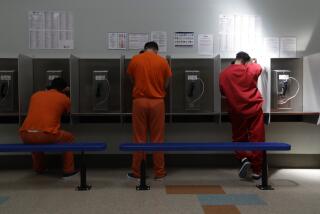Lifestyles of the rich and powerful
ETHICS REFORMS are breaking out like hives in the nation’s centers of money and power. In Washington, in the wake of the Jack Abramoff scandal, congressmen are falling over themselves to propose bans on gifts and freebie trips from lobbyists. In New York, the National Assn. of Securities Dealers and the New York Stock Exchange this week offered new guidelines on permissible levels of entertainment and booty that brokers and bankers can accept and exchange.
These parallel defensive efforts are being undertaken by two industries whose public images have been tarnished by scandals. There’s widespread suspicion that players in both spheres don’t always act in the best interest of the people who pay their salaries -- the investing public for Wall Street, the voting public for Washington -- but instead steer business and favors to counterparts who ply them with fine wines and fancy trips.
But although the ethical and public relations conundrum they face is similar, the different solutions offered by Wall Street and Capitol Hill highlight a difference in mores, motivations and mentalities in the two realms.
For instance, just as the cost of living in Washington is generally much lower than New York, so too is the market price for influence. House Speaker J. Dennis Hastert’s reform plan, which calls for a ban on travel funded by lobbyists, would prohibit congressmen and their staffers from taking any food or gift worth more than $20 at a sitting -- and worth more than $50 during a year. Congressional Democrats, a generally more downscale crew, believe influence can be bought even more cheaply. They’re calling for a total ban on lobbyist-funded sustenance. Forget about skyboxes and 20-ounce steaks -- Democrats apparently believe a bleacher seat, or a hot dog and Diet Coke bought from a street vendor, can be enough to sway power brokers.
On Wall Street, by contrast, where $20 won’t get you a cab ride uptown, regulators plainly think it costs several times more to purchase the allegiance of a broker who might steer trading business your way. A long-standing NASD rule, which banned companies from giving “anything worth more than $100 to anyone with whom the member firm employee did business,” was clarified in 1999 to allow “ordinary business entertainment.” In other words, you could spend more than $100 entertaining counterparts as long as the high jinks were “neither so frequent nor so extensive as to raise any question of propriety.”
Translation: Party on, dude. After all, for Wall Street brokers and investment bankers, going to strip joints, ordering $300 bottles of Chateau Margaux and chartering jets for bachelor parties is ordinary business entertainment. And on Wall Street, as in Hollywood, “propriety” is a highly subjective term. (This is a milieu, after all, in which dwarf-throwing and lap dances are regarded as entirely proper.)
It stands to reason that it would take much less to influence congressmen and their staffers than brokers. Unable to maintain two homes and a CEO-style lifestyle on a mere $165,200 a year, cash-poor congressmen are forced to get the basics of life from lobbyists -- if you think the basics of life include golf trips to Scotland, fine cigars and free meals at nice restaurants such as Abramoff’s Signatures.
On Wall Street, by contrast, the gifts and emoluments that serve as business grease aren’t a substitute for income. They’re just a bonus. And on Wall Street, nothing matters more than bonuses.
Many of the brokers and bankers who enjoy lavish entertainment courtesy of other people’s firms could certainly afford to buy all the cigars they can smoke. But every penny spent out of their own pocket is one less they have to spend on the beach house in the Hamptons or the latest model Porsche.
Rather than lay out strict rules, Wall Street regulators have urged firms to adopt what’s being called a “principles-based” approach. The regulators recognize that there should be different standards of entertainment for a client who throws you a $5-million fee compared with maintaining a relationship that brings in $200,000 in revenues a year. On Wall Street, the solution -- like the whole business -- is about percentages. And in classic private-sector fashion, Wall Street is outsourcing the whole enterprise. Each member firm has to come up with and monitor its own plan.
Washington, by contrast, is employing an explicitly top-down, rules-based approach, full of technicalities, time restrictions and explicit language. Under the Republican proposal, a $19.99 baseball hat would be OK, but a $20.50 baseball ticket would be verboten.
I’m not too optimistic about the efficacy of either approach. After all, every Wall Street firm that sold out investors by recommending shabby stocks so that it could continue to reap investment banking revenues -- and that paid through the nose to settle the ensuing lawsuits -- already had a statement of principles that frowned against such activity. In the financial services world, when principles and potential profits clash, cash generally wins.
As for Washington, the whole system runs on the theory that rules exist to be continually amended, augmented, evaded and skirted. That’s what the lobbyists who have allegedly been corrupting congressmen with $25 lunches and Redskins tickets do for a living.
And critics have already noticed loopholes in the reform proposals. The rules proposed by Hastert ban lobbyist-funded meals and travel -- unless, of course, the lobbyist is also making a campaign contribution at the same time. In other words, it’s fine to try to informally buy influence with food and drink as long as you’re also formally trying to buy influence with a campaign contribution.
More to Read
Get the L.A. Times Politics newsletter
Deeply reported insights into legislation, politics and policy from Sacramento, Washington and beyond. In your inbox three times per week.
You may occasionally receive promotional content from the Los Angeles Times.






